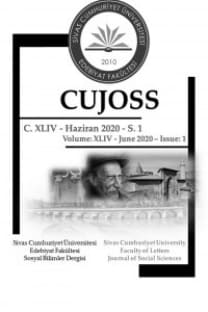ON THE DIVINE FEMININE: READING FAY WELDON'S PUFFBALL THROUGH THUNDER: PERFECT MIND
Kadın merkezciliğine odaklanan Fay Weldon’ın Kurtmantarı adlı romanı birçok feminist
okumaya açık olmasına rağmen henüz kutsal dişilliğe odaklanarak metafiziksel
açıdan incelenmemiştir. Roman her ne kadar
olağan karakterlerle örülmüş gibi gözükse de dini, mitik ve mistik öğelere
olan göndermeler nedeniyle bu tür bir analizin yapılması mümkün kılınır.
Kadınlığın farklı dönemlerinde olan başkahraman Liffey ve karşı karakter Mabs’ın
arasındaki gelgitler birbirinden çok farklı iki anneyi tasvir eder. Fakat,
Neumann’ın Yüce Ana arketipiyle uyumlu bir şekilde her iki kadın da bu
tezatlıklar sayesinde ironik bir biçimde birbirini tamamlar. Liffey ve Mabs’in geçirdikleri
dönüşümler metni dengeleyerek düalistik fakat bütüncül bir yaklaşım sunar. Tezatlıklardan
yola çıkarak varılan bu bütüncül yaklaşımı kutsal dişil bir sesin kendini
karşıt imgelerle tanımladığı Gök
Gürlemesi: Kusursuz Zihin adıyla anılan antik gnostik metinde de
yansımasını görmek mümkün. Kurtmantarı’nı
Gök Gürlemesi ışığında okuyarak
karşıt güçlerin nasıl bir bütünün parçaları olabileceğini görmek mümkün olur.
Bu bağlamda, bu makale Kurtmantarı romanındaki
öğelerin antik gnostik söylemlerle, özellikle Gök Gürlemesi metniyle, yüklü olduğunu önererek ahenksizmiş gibi
görünen yönlerinin kutsal dişil imgesinde nasıl birleştiğini irdeler.
Anahtar Kelimeler:
Fay Weldon, Kurtmantarı, Gnostisizm, Gök Gürlemesi: Kusursuz Zihin, Yüce Ana
ON THE DIVINE FEMININE: READING FAY WELDON’S PUFFBALL THROUGH THUNDER: PERFECT MIND
Focussing on gynocentric issues, Fay Weldon’s Puffball is a text open to many types of
feminist readings but one that has yet to be explored is a metaphysical reading
of the novel focussing on the divine feminine. Although the novel seems to
portray everyday characters, the allusions to biblical, mythical, and mystical
elements allow for this type of an analysis. The ebb and flow between the
protagonist Liffey and antagonist Mabs, who are experiencing various stages of
womanhood, portray two very different types of mothers. Yet, in tune with Neumann’s
Great Mother archetype, both women ironically complement each other through these
contradictions. The transformations Liffey and Mabs undergo inherently balances
the text offering a dualistic yet unified approach. This unification through
contradictions is most illustrative in the ancient gnostic text dubbed Thunder: Perfect Mind, where a divine
feminine voice describes herself through clashing images. By reading Puffball through the lens of Thunder, it becomes possible to see how
opposing forces may be considered as aspects of a whole. In this vein, this
paper suggests that elements of Weldon’s Puffball
resonate with ancient gnostic discourses specifically with the Thunder text where otherwise discordant
aspects are fused in the image of the divine feminine.
Keywords:
Fay Weldon, Puffball, Gnosticism, Thunder: Perfect Mind, Great Mother,
___
BUCKLEY, Jorunn Jacobsen; “Sex, Suffering, and Incarnation: Female Symbolism in Gnosticism”, The Allure of Gnosticism: The Gnostic Experience in Jungian Psychology and Contemporary Culture, (Ed. Robert A. Segal), Open Court, Illinois, 1995.CANE, Aleta F.; “Demythifying Motherhood in Three Novels by Fay Weldon”, Family Matters in the British and American Novel, (Eds. Andrea O’Reilly, Elizabeth Mahn Nollen, and Sheila Reitzel Foor), Bowling Green State University Popular Press, Bowling Green, 1997.
DOWLING, Finuala; Fay Weldon’s Fiction, Fairleigh Dickinson UP, Vancouver, 1998.
FAULKS, Lana; Fay Weldon, Twayne, New York, 1998.
HALL, Nor; The Moon and the Virgin: Reflections on the Archetypal Feminine, Harper and Row, New York, 1980.
JONES, Kathy; The Goddess in Glastonbury, Araidne, Glastonbury, 1990.
JUNG, Carl G.; “Psychological Aspects of the Mother Archetype”, The Archetypes and the Collective Unconscious, (Trans. R. F.C. Hull), Routledge, London, 2010 [1954].
MADEJ-STANG, Adriana; Which Face of Witch: Self-Representations of Women as Witches in Works of Contemporary British Women Writers, Cambridge Scholars, Newcastle upon Tyne, 2015.
McGUIRE, Anne; “Thunder: Perfect Mind”, Ashé! Journal of Experimental Spirituality, 4.3, 2005, pp 417-429.
NEUMANN, Erich; The Origins and History of Consciousness, (Trans. Ralph Manheim), Princeton UP, New Jersey, 1993 [1954].
NEUMANN, Erich; The Great Mother: An Analysis of the Archetype, (Trans. Ralph Manheim), Princeton UP, New Jersey, 1983 [1955].
OLSEN, Nanna Liv Elkjær; “Thunder Perfect Mind – or How Nonsense Makes Sense”, Teologinen Aikakauskirja, 2, 2012, pp. 90-96.
PAGELS, Elaine; Adam, Eve, and the Serpent: Sex and Politics in Early Christianity, Vintage Books, New York, 1989.
QUISPEL, Gilles; “Gnosis and Psychology”, The Allure of Gnosticism: The Gnostic Experience in Jungian Psychology and Contemporary Culture, (Ed. Robert A. Segal), Open Court, Illinois, 1995.
REISMAN, Mara E.; Fay Weldon, Feminism, and British Culture: Challenging Cultural and Literary Conventions, Lexington, London, 2018.
TAUSSIG, Hal, et al; The Thunder: Perfect Mind, A New Translation and Introduction, Palgrave Macmillan, New York, 2010.
Thunder, (Trans. Marvin Meyer), The Nag Hammadi Scriptures, (Ed. Meyer Marvin), HarperCollins Publishers, New York, 2007.
WELDON, Fay; Puffball, Flamingo, London, 2003.
WILLIAMS, Michael Allen; Rethinking “Gnosticism”: An Argument for Dismantling a Dubious Category, Princeton UP, New Jersey, 1999.
WOOD, Juliette; “Celtic Goddesses: Myth and Mythology”, The Feminist Companion to Mythology, (Ed. Carolyne Larrington), Pandora, London, 1992.
- ISSN: 1305-5143
- Yayın Aralığı: Yılda 2 Sayı
- Yayıncı: Sivas Cumhuriyet Üniversitesi Edebiyat Fakültesi
Sayıdaki Diğer Makaleler
INFLUENCE DE LA LITTERATURE FRANÇAISE SUR LA LITTERATURE DU TANZİMAT AU XIXe SIECLE
FAKİR BAYKURT’UN KÖY ROMANLARINDA LAKAPLAR
TANZİMAT DÖNEMİNDEN KISA ÖMÜRLÜ BİR MİZAH GAZETESİ: MEDDAH
Serhat Sabri YILMAZ, Yakup AVCU
BUSINESS ANGELS IN TURKEY: THEIR EMERGENCE AND DEVELOPMENT
ON THE DIVINE FEMININE: READING FAY WELDON'S PUFFBALL THROUGH THUNDER: PERFECT MIND
Feride Özlem ELAGOZ, Gaye Zeynep ÇENESİZ
